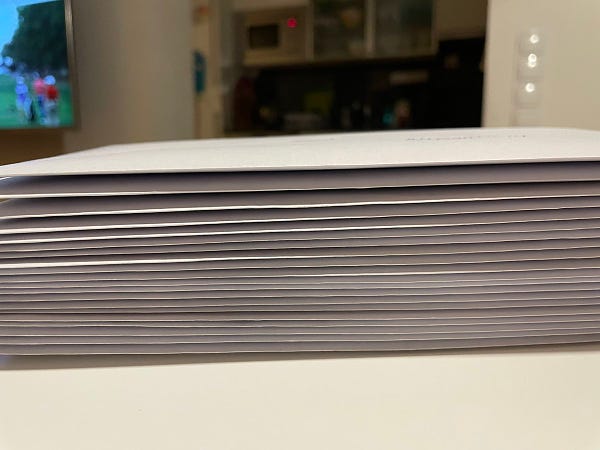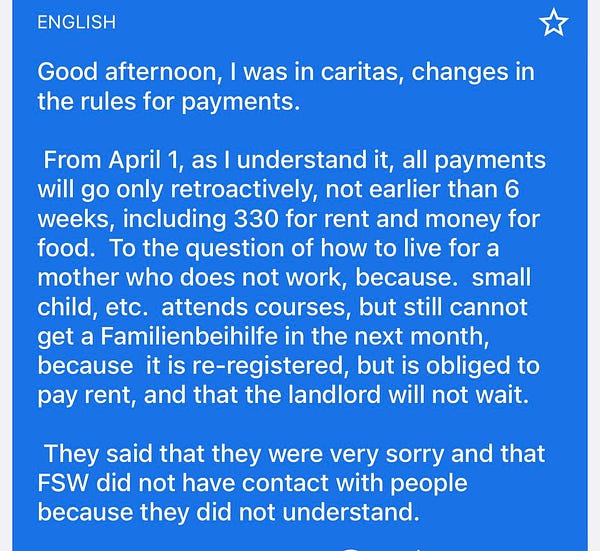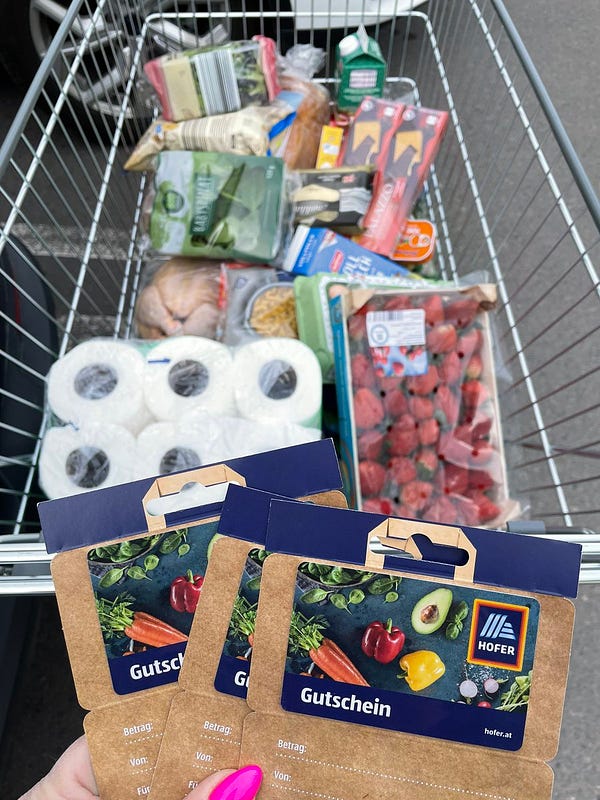Where do we go from here?
A little bit of Austrian politics today (sorry for that). Plus an update on the grocery cards.
Sunday. The sun is shining. Viennese and tourists alike are going about their weekends. I’m sitting in a busy Starbucks, with an hour to kill while my middle child (15) goes for a walk with a Ukrainian teen (18) who is a champion gymnast but only starting to learn German. She nervously asked me in Russian to please tell my daughter to speak slowly. They have set off for the park, and it makes me so happy to see my own kids giving back in this very simple way. Yesterday my youngest had a “coffee date” (they drank unlimited refills of sugar soda at Five Guys) with a Ukrainian girl her own age. Fascinating story: born in China, grew up in central Kyiv, now attending a gymnasium in central Vienna. Her German was good and confident. My son works with several Ukrainian teens. He talks with them online in German and/or English. He continues to be so impressed by their language skills and knowledge in general (“Mama, do they all code?”).
I spent the past few days a little bit frozen. To put it very simply for those of you not in Austria: the political far right (in all sense of that term) has risen in recent years through populist rhetoric (anti-immigrant, anti-covid measures, pro-nationalist, pro-Russia) to a solid 30% of the vote in Austria now. In my opinion, the FPÖ party today is much scarier than it was even back in 2017 when they were in the federal government as a coalition partner of the conservatives until the Ibiza scandal broke and the government fell apart. I don’t use the “N” word because legally you are not supposed to throw that term around, but let’s just say the far right are growing increasingly more radical and more popular as “ordinary” Austrians look for someone to blame for their economic woes and the pandemic and the country no longer being all white nor all German speaking.
The real problem though are the mainstream parties. The ÖVP (conservatives) have moved more to the right (the chancellor recently suggested building a wall in Europe along the lines of what Trump proposed for the U.S.-Mexico border) in order to try not to lose more voters to the far right, and a major red line was crossed on Friday when in Lower Austria, the rich, large federal state which surrounds Vienna, the ÖVP announced they had formed a new coalition with the FPÖ. The FPÖ team in Lower Austria includes politicians who have been tried for abuse of refugees in their care, recently told a group of immigration-background teens in Vienna that the Austrian capital would be better off without them, and men who sang Nazi songs and made Hitler salutes in their free time. No, I am not making any of this up. So the conservatives (who run the federal government with the Greens as a minority partner) decided to get into bed with the very far right rather than work with the social democrats. In short — a very, very bad sign. No moral scruples. Only power and money and hate. The new program includes reference to school children being mandated to speak only German during the breaks at school.

The social democrats (SPÖ) are not innocent in all this, of course. They have been performing pretty poorly in most recent elections, probably do to a lack of clear, issue-specific communication about what their priorities really are as the main “opposition” party at the moment, and a major fight for leadership of the party which has resulted in much mudslinging and dirty laundry airing in recent months, and how now culminated with a vote by party members on who should run the party going forward: a Viennese doctor who once served as health minister but who hasn’t proven herself to be a strong leader and has been frustratingly quiet on too many key issues (including Ukraine), and a Burgenland policeman who rose through the ranks to become governor of Burgenland, Austria’s smallest state, a mostly agricultural area where his tough guy tactics vis a vis refugees are popular, making him a leftist who leans to the right when it comes to immigration. Frankly, if these are the only two candidates, I think the social democrats will suffer for years to come until fresh, younger blood gives new life to the party.
So, broadly speaking, you have Austria lurching to the right, not discussing “neutrality”, not truly getting in line with the rest of Europe and NATO countries when it comes to supporting Ukraine’s fight for its life. Austria acts a bit like Switzerland (“we are just observers who are happy to count your money”) and a bit like Hungary (certainly the far right in Austria is basically on the same page as Orban, and that is now 3 in 10 voters feeling like that). Also super important to remember many, many even second generation Austrians cannot vote here as Austrian citizenship is notoriously difficult and expensive to apply for even for residents who were born here to parents with foreign passports and have lived their entire lives in Austria. It goes without saying this is a huge number of potential voters for the political center and left who now cannot participate in the democratic process. Like me, for example. I don’t have an Austrian passport because Austria does not recognise dual citizenship and I am not prepared to give up my U.S. passport. So I, like many others, do not vote here.
So, with that very long introduction, I simply wanted to say I am now, more than ever before, really worried about the direction Austria is taking now. It feels like many parallels to the the 1930s, from what I have read about them.


Yesterday I was on a downtown shopping street on a busy Saturday. I look around and wonder who are these people who vote for racism, xenophobic, who want to create two classes of people. In this context, I think about the war raging not so far from here, and how many people go about their daily lives relatively indifferent to the whole thing, thinking it could never happen to them, also relatively indifferent to the struggles of so many — whether the working poor in Austria or refugees from Ukraine trying to get by on financial aid far below what Austria offers to its own unemployed. I guess what I want to say is I see ordinary people in a different light now. Just like I am continually positively surprised by all the ordinary people who have stepped forward to help send Hofer cards and help Ukrainian families in a myriad of ways, I am pained by the realisation how many people around us would happily live in almost any political environment as long as their own bank account balance would not decrease. It must have felt like that a bit in America under Trump. You look around and realise every second person voted for him. Heck, my own dad voted for him. Twice. I know the mentality and I know the attitude. Yet in Austria, with its terribly dark history, which was never really properly dealt with, I find these recent developments incredibly frightening. And the mainstream right, the conservatives, are responsible for breaking the taboo of not partnering up with the far right, and the socialists are responsible for not getting their collective shit together, wasting all their time on infighting rather than fighting for the average man, woman and child.
Rather than let this anxiety take over, I try to focus on what I can do and can change. Yesterday, I received another 20 cards. Hand deliveries I will do later this afternoon to the Arrival Center. More texts coming in this morning. Ukrainians do not give me a weekend, and they know I open my messages, so…it’s my own fault.



A lot of my time lately has been spent giving advice on bureaucracy and payments which I am terrible at. So much of it seems to be a pure matter of luck: did you get a competent, understanding social worker that day sitting in front of you, or did someone with no heart make a stupid mistake and now you lose sleep for nights worrying about how to fix it?



This morning I read this:



Honestly, they should send the message back to Ukraine: don’t even think about coming to Austria unless you can afford a several months’ expenses in Europe from your own savings. Of course, the vast majority of the Ukrainians I meet cannot. Everywhere you turn, the screws are tightening.

Turning to Ukraine, do read this harrowing piece by The Washington Post about the lives of disabled adults in the country since the war began. I genuinely had no idea it was that bad. I so wish more could be done to try and help IN Ukraine. When disabled adults come to Europe, if volunteers in Ukraine help them to reach countries like Austria, they do not receive any “extra” services here other than healthcare. They will be housed in group accommodation like everyone else. They end up looking after each other. They can apply for “handicapped” status in Austria, but this only entitles them to a parking permit at most. There are no extras. Life in Europe is hard and not for everyone. I so wish more was being done across the board to help vulnerable people stay in Ukraine. I understand why volunteers in Ukraine try to talk them into going abroad, but part of me wants to scream because I know what awaits those here who cannot independently advocate for themselves: nothing.
So I will keep doing what I can for as long as we have something to offer. My time to answer questions and Hofer cards provided we receive them / funding. I still very much want to do that bake & book sale, but need to find the right venue. Am thinking a Sunday afternoon. Something cosy, easily reachable on public transport, and kid-friendly.


The girls just returned from the park. Katya is 18 and on the Ukrainian national team for rhythmic gymnastics. She now trains six times a week here in Vienna with an Austrian team. She finished high school in Ukraine and is now studying online at a Ukrainian college but would like to apply to a university in Vienna. But for that you need A2 German. She has only A1. When her mother and she asked ÖIF (integration fund of Austria — quite the oxymoron) if Katya could sign up for an A2 German course, they were told no, the new rule is the adult has to be either in university or working full time. Katya cannot be in university because she doesn’t have A2 German (a chicken vs egg situation), and she cannot work because of her sport. An A2 German class would cost €700, Katya explains. I added that my 15 year old daughter is happy to practice conversation, but she isn’t a teacher. Of course you need to learn a foreign language properly in a classroom if you plan to study in it one day.
Such a shame. I know Ukrainian pensioners who have been given an A2 German course in Vienna from April (Valentina, for example). Why would an 18 year-old young woman not qualify? She seems like exactly the kind of candidate who could learn German and give something back here one day. Exactly the kind of “refugee” you want to “integrate”.
Sometimes it really feels like blowing against windmills. Everywhere you turn, a roadblock goes up. Yet the traffic report says the road is clear. It is an illusion. A dishonest illusion. Huge money flows to professional pencil pushers who often make vulnerable people’s lives more difficult rather than assisting them. It’s almost making me a libertarian. I just want to cut the fat everywhere and give the money to those who need it. I know that’s unrealistic for a thousand reasons, but the current “system” is truly broken and the best any politician could do would be to blow it up and start over. But that won’t happen here in Austria anytime soon.
I fear it will get far worse before it gets better.




